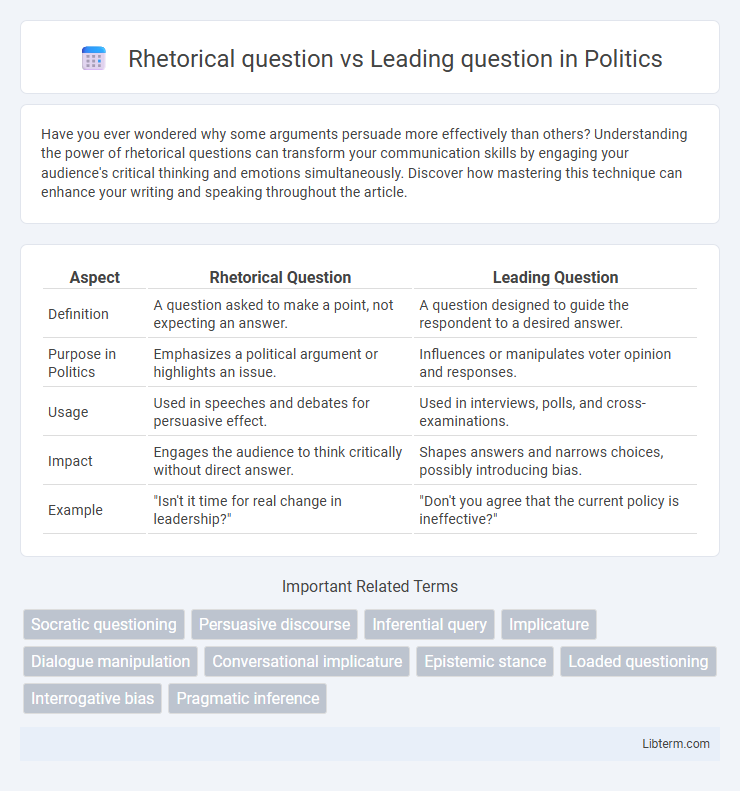Have you ever wondered why some arguments persuade more effectively than others? Understanding the power of rhetorical questions can transform your communication skills by engaging your audience's critical thinking and emotions simultaneously. Discover how mastering this technique can enhance your writing and speaking throughout the article.
Table of Comparison
| Aspect | Rhetorical Question | Leading Question |
|---|---|---|
| Definition | A question asked to make a point, not expecting an answer. | A question designed to guide the respondent to a desired answer. |
| Purpose in Politics | Emphasizes a political argument or highlights an issue. | Influences or manipulates voter opinion and responses. |
| Usage | Used in speeches and debates for persuasive effect. | Used in interviews, polls, and cross-examinations. |
| Impact | Engages the audience to think critically without direct answer. | Shapes answers and narrows choices, possibly introducing bias. |
| Example | "Isn't it time for real change in leadership?" | "Don't you agree that the current policy is ineffective?" |
Understanding Rhetorical Questions
Rhetorical questions are designed to provoke thought rather than elicit an actual response, serving as a persuasive device in speech and writing. Unlike leading questions, which aim to guide the respondent towards a specific answer, rhetorical questions emphasize the speaker's underlying message by implying the answer within the question itself. Understanding rhetorical questions enhances critical reading and effective communication by recognizing their role in emphasizing points and engaging the audience emotionally.
Defining Leading Questions
Leading questions suggest a specific answer by implying a desired response within the query's wording, often guiding the respondent toward confirmation. Unlike rhetorical questions, which do not require an answer and are used to emphasize a point, leading questions manipulate the respondent's choice to influence testimony or opinions. In legal and survey contexts, leading questions can introduce bias, impacting the reliability of information collected.
Key Differences Between Rhetorical and Leading Questions
Rhetorical questions are designed to emphasize a point or provoke thought without expecting an actual answer, often relying on shared knowledge or assumptions. Leading questions guide respondents toward a specific answer by embedding the desired response within the question itself. The key difference lies in intent: rhetorical questions seek reflection or persuasion, while leading questions aim to influence or manipulate the response.
Purposes of Rhetorical Questions
Rhetorical questions serve to engage the audience by prompting reflection or emphasizing a point without expecting an answer, often reinforcing the speaker's intent or highlighting underlying assumptions. Unlike leading questions, which subtly influence an answer, rhetorical questions stimulate thought and persuade through implication rather than direct suggestion. Their purpose includes evoking emotion, drawing attention to a particular issue, and encouraging agreement without explicit argumentation.
Purposes of Leading Questions
Leading questions are designed to subtly influence a respondent's answer by implying a particular response, often used in legal settings to confirm facts or in surveys to guide opinions. Their primary purpose is to shape the direction of the conversation or testimony, ensuring answers align with the questioner's objectives. Unlike rhetorical questions, which provoke thought without expecting an answer, leading questions aim to elicit specific, desired information.
Examples of Rhetorical vs Leading Questions
Rhetorical questions, such as "Isn't it obvious that climate change is urgent?" emphasize a point without expecting an answer, reinforcing the speaker's perspective. Leading questions direct the respondent toward a desired answer, as seen in "You agree that climate policies need to be stricter, don't you?" While rhetorical questions assert an idea, leading questions subtly influence the response by implying the preferred reply.
Impact on Communication: Rhetorical vs Leading
Rhetorical questions enhance communication by prompting listeners to think deeply and reflect on a point without expecting an explicit answer, thereby reinforcing the speaker's message. Leading questions, by contrast, guide the respondent toward a specific answer, which may limit open dialogue and affect the authenticity of the response. The impact on communication differs as rhetorical questions encourage engagement and critical thinking, while leading questions can introduce bias and reduce the richness of information gathered.
When to Use Each Question Type
Rhetorical questions are best used when seeking to emphasize a point or provoke thought without expecting an actual answer, often in speeches, persuasive writing, or presentations. Leading questions are effective in interviews, surveys, or legal settings where the goal is to guide the respondent toward a specific answer or reveal certain information. Understanding the context and desired outcome helps determine whether to use a rhetorical question to engage or a leading question to influence responses.
Common Misconceptions
Rhetorical questions often get confused with leading questions, yet they serve different purposes: rhetorical questions imply an answer and provoke thought, while leading questions guide respondents toward a specific answer. A common misconception is that rhetorical questions are manipulative, but their primary function is to emphasize a point rather than influence a response. Leading questions, frequently used in legal or survey contexts, deliberately steer answers and can bias data or testimonies if not designed carefully.
Tips for Effectively Using Questions in Writing and Speech
Rhetorical questions provoke thought without expecting an answer, enhancing engagement by stimulating readers' or listeners' reflection on a topic. Leading questions, designed to guide respondents toward a specific answer, can influence opinions but risk appearing manipulative if overused or too obvious. To effectively use questions in writing and speech, strategically balance rhetorical questions to emphasize key points and deploy leading questions carefully to steer discussions without undermining credibility.
Rhetorical question Infographic

 libterm.com
libterm.com